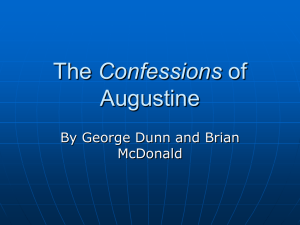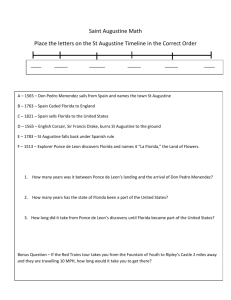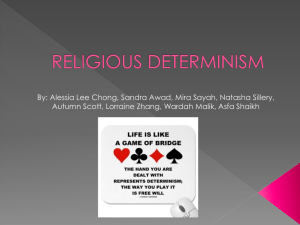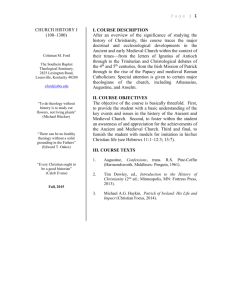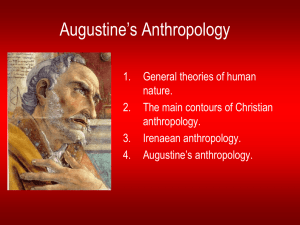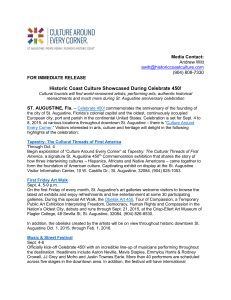An Excerpt from Saint Augustine`s Confessions – Translated by Sr
advertisement
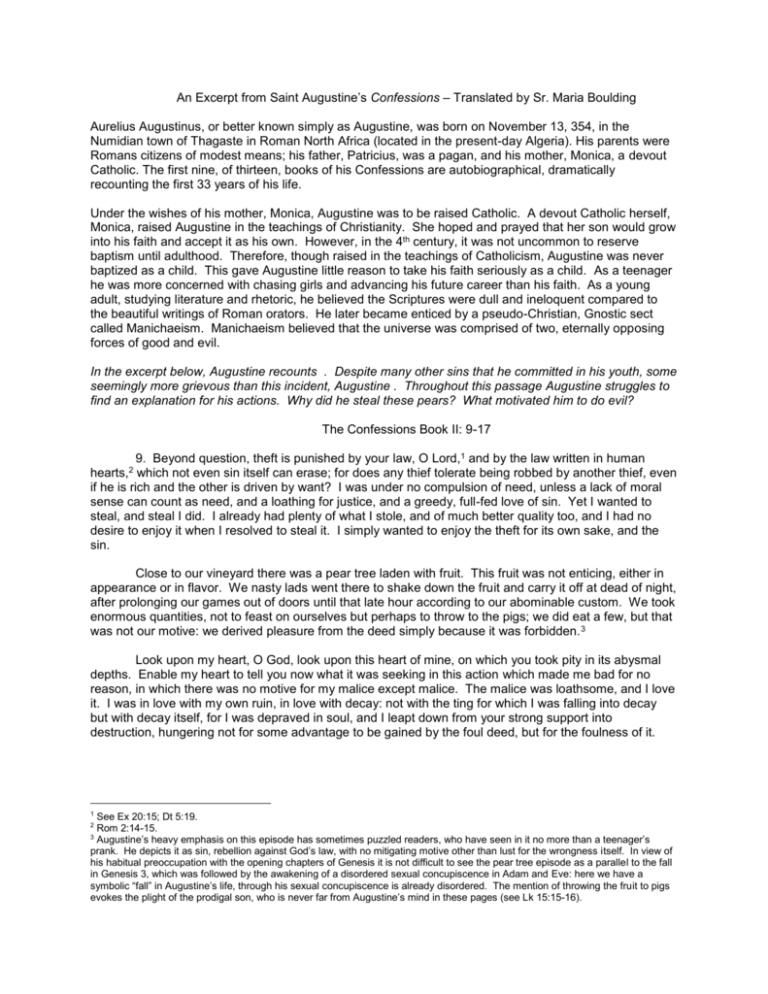
An Excerpt from Saint Augustine’s Confessions – Translated by Sr. Maria Boulding Aurelius Augustinus, or better known simply as Augustine, was born on November 13, 354, in the Numidian town of Thagaste in Roman North Africa (located in the present-day Algeria). His parents were Romans citizens of modest means; his father, Patricius, was a pagan, and his mother, Monica, a devout Catholic. The first nine, of thirteen, books of his Confessions are autobiographical, dramatically recounting the first 33 years of his life. Under the wishes of his mother, Monica, Augustine was to be raised Catholic. A devout Catholic herself, Monica, raised Augustine in the teachings of Christianity. She hoped and prayed that her son would grow into his faith and accept it as his own. However, in the 4th century, it was not uncommon to reserve baptism until adulthood. Therefore, though raised in the teachings of Catholicism, Augustine was never baptized as a child. This gave Augustine little reason to take his faith seriously as a child. As a teenager he was more concerned with chasing girls and advancing his future career than his faith. As a young adult, studying literature and rhetoric, he believed the Scriptures were dull and ineloquent compared to the beautiful writings of Roman orators. He later became enticed by a pseudo-Christian, Gnostic sect called Manichaeism. Manichaeism believed that the universe was comprised of two, eternally opposing forces of good and evil. In the excerpt below, Augustine recounts . Despite many other sins that he committed in his youth, some seemingly more grievous than this incident, Augustine . Throughout this passage Augustine struggles to find an explanation for his actions. Why did he steal these pears? What motivated him to do evil? The Confessions Book II: 9-17 9. Beyond question, theft is punished by your law, O Lord,1 and by the law written in human which not even sin itself can erase; for does any thief tolerate being robbed by another thief, even if he is rich and the other is driven by want? I was under no compulsion of need, unless a lack of moral sense can count as need, and a loathing for justice, and a greedy, full-fed love of sin. Yet I wanted to steal, and steal I did. I already had plenty of what I stole, and of much better quality too, and I had no desire to enjoy it when I resolved to steal it. I simply wanted to enjoy the theft for its own sake, and the sin. hearts,2 Close to our vineyard there was a pear tree laden with fruit. This fruit was not enticing, either in appearance or in flavor. We nasty lads went there to shake down the fruit and carry it off at dead of night, after prolonging our games out of doors until that late hour according to our abominable custom. We took enormous quantities, not to feast on ourselves but perhaps to throw to the pigs; we did eat a few, but that was not our motive: we derived pleasure from the deed simply because it was forbidden. 3 Look upon my heart, O God, look upon this heart of mine, on which you took pity in its abysmal depths. Enable my heart to tell you now what it was seeking in this action which made me bad for no reason, in which there was no motive for my malice except malice. The malice was loathsome, and I love it. I was in love with my own ruin, in love with decay: not with the ting for which I was falling into decay but with decay itself, for I was depraved in soul, and I leapt down from your strong support into destruction, hungering not for some advantage to be gained by the foul deed, but for the foulness of it. 1 See Ex 20:15; Dt 5:19. Rom 2:14-15. 3 Augustine’s heavy emphasis on this episode has sometimes puzzled readers, who have seen in it no more than a teenager’s prank. He depicts it as sin, rebellion against God’s law, with no mitigating motive other than lust for the wrongness itself. In view of his habitual preoccupation with the opening chapters of Genesis it is not difficult to see the pear tree episode as a parallel to the fall in Genesis 3, which was followed by the awakening of a disordered sexual concupiscence in Adam and Eve: here we have a symbolic “fall” in Augustine’s life, through his sexual concupiscence is already disordered. The mention of throwing the fruit to pigs evokes the plight of the prodigal son, who is never far from Augustine’s mind in these pages (see Lk 15:15-16). 2 10. The beautiful form of material things attracts our eyes, so we are drawn to gold, silver and the like. We are powerfully influenced by the feel of things agreeable 4 to the touch; and each of our other senses finds some quality that appeals to it individually in the variety of material objects. There is the same appeal in worldly rank, and the possibility it offers of commanding and dominating other people: this too holds its attraction, and often provides an opportunity for settling old scores. We may seek all these things, O Lord, but in seeking them we must not deviate from your law. The life we live here is open to temptation by reason of a certain measure and harmony between its own splendor and all these beautiful things of low degree. Again, the friendship which draws human being together in a tender bond is sweet to us because out of many minds it forges a unity. 5 Sin gains entrance through these and similar good things when we turn to them with immoderate desire, since they are the lowest kind of good and we thereby turn away from the better and higher: from you yourself, O Lord our God, and your truth and your law. These lowest goods hold delights for us indeed, but no such delights as does my God, who made all things; for in him the just man finds delight, and for upright souls 6 he himself is joy. 11. So then, when people look for the reason why some criminal act has been committed, their account is usually reckoned credible only when it is evident that there may have been greed on the malefactor’s part to gain possession of goods belonging to someone else – those goods we have called “lowest” – or fear of losing his own; for these good things truly are beautiful and lovely in their own way, even though base and mean in comparison with the higher goods that bring us true happiness. Suppose someone has committed homicide. Why did he do it? Perhaps he was in love with the victim’s wife, or coveted his estate, or wanted to steal from him in order to support himself, or feared to be robbed of the like himself by the other man, or had been injured and burned for revenge. It is likely that he would kill another person without any motive, simply because he enjoyed killed? Who could believe that? Admittedly it is reported of a certain frenzied and outrageously cruel man that “he preferred being evil and cruel with no provocation,”7 but a motive for his crimes was nonetheless declared: he wished to ensure, the historian tells us, that “neither hand nor mind should atrophy from inaction.” 8 We might further ask, “And what else did he intend?” He meant to use crime for the training of his young conspirators, in order eventually to gain control of the city and win honors, power and riches: thus he would be free from fear of the law and from the difficulties in his circumstances arising from “shortage of money and his guilty record.”9 Even Catiline, then did not love his criminal acts for their own sake, but only the advantages he had in the view when committing them. 12. How does this apply to me, poor wretch? What did I love in you, O my theft, what did I love in you, the nocturnal crime of my sixteenth year? There was nothing beautiful about you, for you were nothing but a theft. Are you really anything at all, for me to be speaking to you like this? O good God, creator of all things10 and more beautiful than all of them, those pears we stole did have a certain beauty because they were your creation – yours, O God, who are the highest good and the true food for me. Those pears were beautiful, but they were not what my miserable soul loved. I had plenty of better ones, and I plucked them only for the sake of stealing, for once picked I threw them away. I feasted on the sin, nothing else, and that I relished any enjoyed. Even if some morsel of the pears did enter my mouth, it was only the criminal act that lent it savor. So now, Lord my God, when I ask what it was that gave me pleasure in that theft, I find nothing of fair, seductive form at all. I do not mean simply that it lacked the beauty to be found in justice and prudence, or the beauty of the human mind and intelligence, or that of our senses and bodily life, or the beauty inherent in the stars, so lovely in their appointed places, or in the earth and the sea full of young life born there to replace the things that die. No, I mean more: my theft lacked even the shame, shadowy beauty with which even vice allures us. 11 Congruentia, a suitability, fittingness, correspondence, is central to Augustine’s idea of beauty. The first hint of the only possible good that, as Augustine will eventually admit, played a part in his motives for the theft. See Ps 63:11(64:10). 7 Sallust, Cat. 16.3. Augustine will name Catiline at the end of the paragraph. 8 Ibid, 5.5. 9 Ibid, 5.7. 10 See 2 Mc 1:24; Ambrose, Hymn 1.2. 11 Augustine has here traced four grades of goodness or beauty in descending order: moral (justice and prudence), intellectual (mind and intelligence), sensuous, and organic; he closes the sequence with a sham beauty that fades almost to nothing. 4 5 6 13. For in vice there lurks a counterfeit beauty: pride, for instance – even pride apes sublimity, whereas you are the only God, most high above all things. As for ambition, what does it crave but honors and glory, while you are worthy of honor beyond all others, and eternally glorious? The ferocity of powerful men aims to inspire fear; but who is to be feared except the one God? Can anything be snatched from his power or withdrawn from it – when or where or wither or by whom? Flirtatiousness aims to arouse love by its charming wiles, but nothing can hold more charm than your charity, nor could anything be loved to great profit than your truth, which outshines all else in its luminous beauty. Curiosity poses as pursuit of knowledge, whereas you know everything to a supreme degree. Even ignorance or stupidity masquerades as simplicity and innocence, but nothing that exists it simply than yourself; and what could be more innocent than you, who leave the wicked to be hounded by their own sins? Sloth pretends to aspire to rest, but what sure rest is there save the Lord? Lush living likes to be taken for contented abundance, but you are the full and inexhaustible store of a sweetness that never grows stale. Extravagance is a bogus generosity, but you are the infinitely wealthy giver of all good things. Avarice strives to amass possessions, but you own everything. Envy is contentious over rank accorded to another, but what ranks higher than you? Anger seeks revenge, but who ever exacts revenge with greater justice than yourself? Timidity dreads any unforeseen or sudden threat to the things it loves, and take precautions for their safety; but is anything sudden or unforeseen to you? Who can separate what you love from you?12 Where is ultimate security to be found, except with you? Sadness pines at the loss of the good things with which greed took its pleasure, because it wants to be like you, from whom nothing can be taken away.13 14. A soul that turns away from you therefore lapses into fornication 14 when it seeks apart from you what it can never find in pure and limpid form except by returning to you. All those who wander far away and set themselves up against you are imitating you, but in a perverse way;15 yet by this very mimicry they proclaim that you are the creator of the whole of nature, and that in consequence there is no place whatever where we can hide from your presence. With regard to my theft, then: what did I love in it, and in what sense did I imitate my Lord, even if only with vicious perversity? Did the pleasure I sought lie in breaking the law at least in that sneak way, since I was unable to do so with any show of strength? Was I, in truth a prisoner, trying to simulate a crippled sort of freedom, attempting a shady parody of omnipotence by getting away with something forbidden? How like that servant of yours who fled from his Lord and hid in the shadows! 16 What rottenness, what a misshapen life! Rather a hideous pit of death! To do what was wrong simply because it was wrong – could I have found pleasure in that? 15. How can I repay the Lord17 for my ability to recall these things without fear? Let me love you, Lord, and give thanks to you and confess to your name, because you have forgiven my grave sins and wicked deeds.18 By your sheer grace and mercy you melted my sins away like ice. 19 To your grace also do I ascribe whatever sins I did not commit, for what would I not have been capable of, I who could be enamored even of a wanton crime? I acknowledge that you have forgiven me everything, both the sins I willfully committed by following my own will, and those I avoided through your guidance. Is there anyone who can take stock of his own weakness and still dare to credit his chastity and innocence to his own efforts? And could such a person think to love you less, on the pretext that he has had smaller need of your mercy, that mercy with which you forgive the sins of those who turn back to you? If there is anyone whom you have called, who by responding to your summons has avoided those sins which he finds me remembering and confessing in my own life as he reads this, let him not mock me; 12 See Rom 8:35 All through this paragraph Augustine is demonstrating that each vice is a dishonest imitation of some attribute of God, and a pretension to possess apart from God something that he alone can give, since he alone possess it authentically and in fullness. 14 See Ps 72(73):27. 15 The tempter’s promise to Adam and eve is in the background: You shall be like gods (Gn 3:5). 16 Adam (Gn 3:8-10), with whom Augustine identifies. 17 See Ps 115(116):12. 18 Professor O’Donnell’s comment cannot be bettered here: “Memory without fear is the fruit of forgiveness; love, thanksgiving and confession are repayment to God for the forgiveness that has preceded all confession” (Volume 2, page 140). 19 See Sir 3:17. 13 for I have been healed by the same doctor who has granted him the grace not to fall ill, or at least to fall ill less seriously. Let such a person therefore love you just as much, or even more, on seeing that the same physician who rescued me from sinful diseases of such gravity has kept him immune. 16. What fruit did I ever reap from those things which I now blush to remember,20 and especially from that theft in which I found nothing to love save the theft itself, wretch that I was? It was nothing, and by the very act of committing it I became more wretched still. And yet, as I recall my state of mind at the time, I would not have done it alone; I most certainly would not have done it alone. It follows, then, that I also loved the camaraderie with my fellow-thieves. So it is not true to say that I loved nothing other than the theft? Ah, but it is true, because that gang-mentality too was a nothing. What was it in fact? Who can teach me, except the One who illumines my heart21 and distinguishes between its shadows? Why has this question come into my mind now, to be examined and discussed and considered? If the object of my love had been the pears I stole, and I simply wanted to enjoy them, I could have done it alone; similarly, if the act of committing the sin had sufficed by itself to yield me the pleasure I sought, I would not have further inflamed my itching desire by the stimulation of conspiracy. But since my pleasure did not lie in the pears, it must have been in the crime as committed in the company of other who shared in the sin. 17. What kind of attitude was that? An extremely dishonorable one, certainly; alas for me, that I entertained it! Yet what exactly was it? Who understands his faults? 22 The theft gave us a thrill, and we laughed to think we were outwitting people who had no idea what we were doing, and would angrily stop us if they knew. Why could I not have derived the same pleasure from doing it alone? Perhaps because it is not easy to enjoy a joke by oneself? Not easy, to be sure, but it does sometimes happen that people who are entirely alone, with no one else present, are overcome by laughter, if something very funny presents itself to their senses or their thoughts. Possibly…but I would not have done that deed alone; in no way would I have done it alone. In your presence I declare it, my God, this is my soul’s vivid remembrance. On my own I would not have perpetrated that theft in which I felt no desire for what I stole, but only for the act of stealing; to do it alone would have aroused no desire whatever in me, nor would I have done it. What an exceedingly unfriendly form of friendship that was! 23 It was a seduction of the mind hard to understand, which instilled into me a craving to do harm for sport and fun. I was greedy for another person’s loss without any desire on my part to gain anything or to settle a score. Let the others only say, “Come on, let’s go and do it!” and I am ashamed to hold back from the shameless act. 20 See Rom 6:21. See Sir 2:10. 22 See Ps 18:13(19:12). 23 Augustine held a very high view of friendship, but here it is corrupt and corrupting friendship, a theme of Book II. 21

